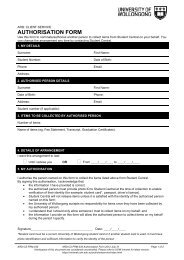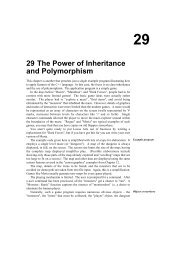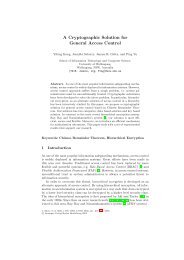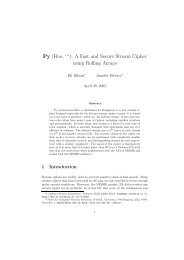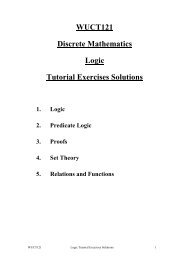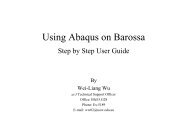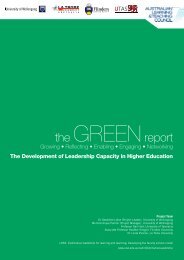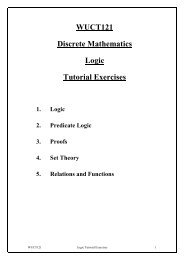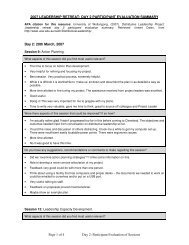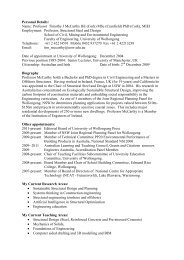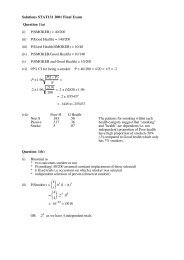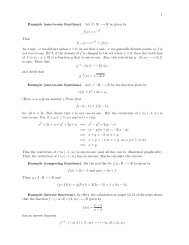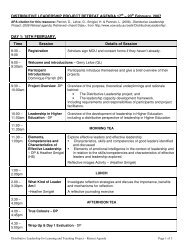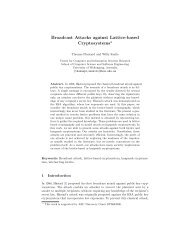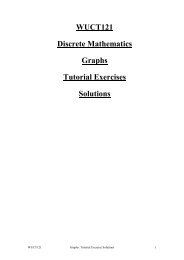india author m 1- a-nan - University of Wollongong
india author m 1- a-nan - University of Wollongong
india author m 1- a-nan - University of Wollongong
You also want an ePaper? Increase the reach of your titles
YUMPU automatically turns print PDFs into web optimized ePapers that Google loves.
NIVEN, ALISTAIR. "Historical Imagination in the Novels <strong>of</strong> Ahmed Ali" JIWE 8.1-2<br />
(January-July 1980):3-13. Reprinted in SINGH, KIRPAL ed. Through Different Eyes:<br />
Foreign Responses to Indian Writing in English Calcutta: Writers Workshop, 1984: 1-15.<br />
Unlike much Third World fiction recording the disappearing past, Ali’s novels<br />
Twilight in Delhi and Ocean <strong>of</strong> Night are not rural, but celebrate two centres <strong>of</strong> urban<br />
civilisation: Delhi and Lucknow, fatalistically hymning the fading glories <strong>of</strong> <strong>india</strong>n islamic culture<br />
and the plight <strong>of</strong> individuals cut <strong>of</strong>f from tradition. The novels were both written in the late<br />
thirties (though Ocean only appeared in 1964) still in an Indian context (notes metaphysical<br />
simliarities between Rao and Ali in Ocean and engagé echoes <strong>of</strong> A<strong>nan</strong>d) . Later poetry<br />
conventionally reproduces a muslim theme <strong>of</strong> mortal transience and death. Images <strong>of</strong> darkness<br />
envelop the novels but are related to linked private and public events and reistered in Asghar’s<br />
swings between fantasy, self-pity and nostalgia, and Mir Nihal’s growing old. The mass <strong>of</strong><br />
humanity lives on in unaltered rhythm <strong>of</strong> rise and fall, reflecting LAi’s essentially classical<br />
outlook. Notes a “kinship <strong>of</strong> mood” to Eliot, especially in Ocean with its images <strong>of</strong> time as<br />
dance. Ali’s writing in English threatens to become part <strong>of</strong> the cultural decline from Urdu<br />
classical culture into modernity, just as its prose can become slack and its elegiac tone<br />
bathetic. Ocean moves to symbolism and dreams but is not altogether the lesser work; both<br />
novels are saved by the affirmation <strong>of</strong> God’s constancy and human nobility in endurance and<br />
the dignity <strong>of</strong> Biblical-Koranic cadence.<br />
SHANKAR, D.A. "Ahmed Ali's Twilight in Delhi" Literary Criterion 15.1 (1980):73-80.<br />
Descriptive appreciation <strong>of</strong> Ali’s detailing <strong>of</strong> the texture <strong>of</strong> a lost way <strong>of</strong> life. A classic<br />
relies on provincial rootedness, grounding ideas in individual sensibility as well as collective<br />
social history. Details <strong>of</strong> pigeons show the personalities <strong>of</strong> people around them and the values<br />
<strong>of</strong> a class and period now crumbling under foreign intrusion. The novel remains a minor classic<br />
limited by its closeness to its central family: it needs irony, humour and “comprehensiveness <strong>of</strong><br />
understanding”.<br />
STILZ, GERHARD. “‘Live in Fragments No Longer’: A Conciliatory Analysis <strong>of</strong> Ahmed<br />
Ali’s Twilight in Delhi” in DAVIS, GEOFFREY & MAES-JELINEK, HENA eds. Crisis and<br />
Creativity in the New Literatures in English Amsterdam’Atlanta: Rodopi, 1990: 369-387.<br />
Bio-bibliographic survey <strong>of</strong> contradictions in Ali’s life (India/Pakistan, Urdu/English,<br />
politics/Art) including his espousing both modern change and nostalgia for romantic beauty.<br />
His twilight metaphor corresponds to an “existential ambivalence” that reconciles opposites<br />
Narrative modes derive from the psychological novel <strong>of</strong>fset by repetetive emphasis <strong>of</strong> a<br />
message and swinging from realism to romantic pathos. Twilight shows “the decline <strong>of</strong> a world<br />
that places art above reality”.<br />
Alkazi, Roshen<br />
DUBEY, SURESH CHANDRA. "Roshen Alkazi and Mamta Kalia" in DWIVEDI, A.N.<br />
"Eves' Song: Contemporary English Verse by Indian Women" Studies in Contemporary Indo-<br />
English Verse: A Collection <strong>of</strong> Critical Essays. Vol. I Female Poets Bareilly: Prakash Book<br />
Depot, 1985: 201-16.<br />
Amanuddin, [Syed? or Urdu? Pakistan?]<br />
AMANUDDIN, SYED. "The Image <strong>of</strong> Woman in My Poetry" SARev (July 1979): 36-42.<br />
DIESENDORF, MARGARET. "Early Love Poems <strong>of</strong> Amanuddin" Creative Moment 3.1<br />
(1974):35-41.



